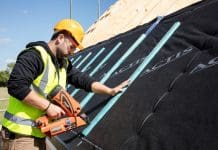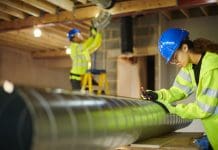What was once considered a male-dominated world is now home to ambitious, skilled women who are breaking down the barriers to smash gender stereotypes and bring a fresh perspective to the ever-changing construction industry
Working in construction isn’t just about donning a high vis jacket on a building site. It’s a welcoming, nurturing environment where women have a huge opportunity for success in a dynamic, diverse and evolving industry. Whether it’s working behind the scenes in the marketing department, operating a crane on site, coordinating BIM or quantity surveying from head office, the construction industry has never been a more varied and exciting career choice for skilled women, such as Sofia Noor and Amelle Mestari.
Sofia Noor and Amelle Mestari both work for Bouygues in the UK, and are also members of Welink UK, an internal network of women which aims to facilitate the integration and development of skilled women. It encourages gender equality in the sector and helps women raise their self-confidence and career profile so they feel at ease to express ambitions more easily.
‘Being a woman is no obstacle to success within the construction sector’
Despite coming from different backgrounds and following completely different routes into the world of construction, both are shining examples of how being a woman is no obstacle to success within the construction sector.
Sofia Noor joined Bouygues UK Graduate scheme in 2018 and is now a Construction Site Manager. She has a real passion for building and wants to inspire anyone, from any walk-of-life, to enter the world of construction.
Sofia has always loved buildings and the idea of putting them together, so it’s always been her dream to manage a project and watch it go from an idea to an actual safe and lovable space.
With an inconsistent education due to moving back and forth between London and Kenya, a lack of support and a sometimes unstable life, she admits she “staggered to the finish line” of education with a Civil Engineering Degree from Portsmouth University, followed by a Masters in Structural Engineering from City University.
She says: “When I first started my career, I thought I knew what I wanted to do. Initially, I was sure I wanted to design buildings. Then I was sure I wanted to build buildings. Then I was sure I wanted to manage the building of buildings.
“What I’ve learnt from this is you have choices, and you can change your mind as long as in that moment you have to give it your all. There are so many paths and opportunities to take within the Engineering/Construction industry for women so I would advise never limit yourself, learn from every opportunity, believe that you can and, whatever you’re doing, make sure to give it everything you’ve got.”
Sofia admits that she was very nervous when she first went onto site.
She says: “I was flooded with imposter syndrome and was afraid that someone would ask me something and I wouldn’t know the answer. I asked myself how could little me belong on a building site managing men twice my age? My biggest fear was that I would prove the people who believed I didn’t belong there to be right.
“But, slowly I learnt that no one on site knew everything, knowledge comes with experience. It’s okay not to know everything and don’t be afraid to just ask.”
Sofia loves construction and is passionate about making it to the very top of this male-dominated industry. She also loves to travel, meet people from around the world and enjoy that country’s architecture.
What advice would Sofia give to a woman thinking of a career in construction?
“I am really keen to give young women the boost they need to do things they think they can’t do. I’d say if a woman wants it enough, then she should do it! Women are more than capable; we just have to have a strong head to deal with the changing stereotypes and go for it.”
Amelle Mestari started her life in construction as a receptionist at Bouygues UK and now over 20 years later, she is the Procurement & Sustainable Development Director for Bouygues E&S Solutions, the energy and services division of Bouygues Construction, after navigating her way around a career that offered many routes to success.

Amelle says: “I started my journey with Bouygues UK a year and a half after arriving in London, as a receptionist on a construction site at King’s College University. Initially, one of the main challenges was making sure that I was fluent in English – to help ensure this was the case, I watched EastEnders; with subtitles, I could just about understand the cockney accents!
“Another challenge back then was the lack of career progression within my role as a receptionist. I felt that I needed to take control of my future, so I discussed the situation with my project director who was very understanding. Shortly after that conversation, I got promoted to Civil Works Secretary. By the end of the project, a year and half later, I was PA to the Project Director, managing the receptionist and the secretary.”
It wasn’t long before Amelle felt that her role wasn’t stretching her. The Head of Procurement for Bouygues UK asked her to join his team. On top of the purchasing of construction materials and services, he oversaw fleet and mobile phones and needed someone to help him, so she accepted the challenge.
There are multiple career opportunities within construction for skilled women
With so many career opportunities within construction, and with supportive employers as well as her own self-belief and ambition, Amelle was able to find a role that really suited her.
Amelle says: “The turning point in my career happened during a meeting with one of our underperforming suppliers when we had to raise our concerns and request improvements on their performance. The Financial Directors for both our construction arm and our Facilities Management businesses attended the meeting. I was about to hand over the agenda I had prepared to my Head of Procurement when he told me that I was chairing the meeting. You can imagine my reaction. How could I, a Procurement Assistant, do this in front of two board directors?! But I stepped up to the challenge and did it. I was grateful for the opportunity given to me by my manager at the time to get me out of my comfort zone.
“When I started as a Procurement Officer most of the managers in my company were men and twice my age. Fortunately, I can say that now, 20 years later, we have a hugely different demographic but I feel that my character, my tenacity, and my experience in construction sites helped me in being more assertive and progress in this role.
“I learnt to work on stakeholder management and developed relationships with our operational managers. They would support me with their engineering knowledge, and I would, in turn, bring in my soft skills (communication, building relationship, negotiation and problem solving). It was not always easy. I had to believe in myself to take ownership of the situation.”
Many women worry about the impact of having a baby will make on their career, often at a time when they are continuing to rise up the career ladder. But Amelle’s experience is a positive one and during her maternity leave, she used something called a KIT (Keep In Touch) days to check-in.
She adds: “My husband was (and still is) incredibly supportive. I had a boss at the time who was understanding and enabled me to work flexibly (leaving early or working from home when needed). Before COVID-19, Bouygues Construction already had a flexible working policy in place. I believe it is absolutely possible to have a career and be an attentive mother, providing your company is understanding of your priorities and allows for flexibility.”
Be one of the ambitious and skilled women in construction, today
Amelle has some key advice for budding women (and men) who want a construction career.
- If you have imposter syndrome, the first step is to recognise it and realise take positive actions to move forward from it. These can include tracking and measuring your success, letting go of your inner perfectionist and look into getting a mentor and/or a coach.
- Make the right selection when employing people. You are only as good as the people who work in your team. A diverse workforce will always be a more successful one.
- Don’t accept someone’s underestimation of your work achievements, it can have a major effect on your future progression. Be prepared at your appraisal and know what you want your next steps to be. Discuss with your manager throughout the year not just at your yearly appraisal.
Inspiring other skilled women
She added: “Throughout my career, I have had some inspiring managers and leaders who were good listeners, who took the time to share their knowledge and put me outside of my comfort zone. They have witnessed the results from the support they gave me. I hope to inspire others to give the same support to other women, because the results can be astonishing.”













